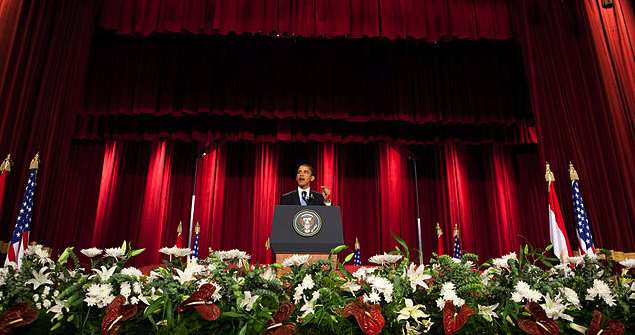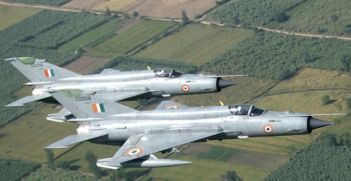Grand Strategy or Strategic Fragmentation?

Obama shies away from rigid alliances in favour of a compartmentalised approach to the Middle East.
On June 4, 2009, Barack Hussein Obama stepped up to the lectern in Cairo University’s Major Reception Hall. The words that followed implied a marked departure from his predecessor’s “either you are with us or you’re with the terrorists” Middle East policy. The cautious hope of his audience was palpable as he outlined the contours of a new foreign policy. “I have come here to seek a new beginning between the United States and Muslims around the world; one based upon mutual interest and mutual respect; and one based upon the truth that America and Islam are not exclusive, and need not be in competition.”
Almost six years later, the region is in an unprecedented state of disarray and critics charge that the president’s policy is equivalently chaotic.
In the eyes of the casual observer, traditional allegiances have given way to relationships of convenience. How can Washington reconcile its support for Saudi Arabia in Yemen – defending the government against Iran-backed rebels – with its own alliance with Tehran in the fight against ISIS in Iraq? For some analysts, this is haphazard policymaking exemplified. Whatever happened to the days of grand strategy? Of simple, clear presidential doctrines? Of allies and adversaries? Obama, they argue, is trying to have his cake and eat it too, which is only undermining US standing in the region and exacerbating local conflicts.
The White House’s case-by-case approach to the current situation certainly looks messy from the outside. However, there is some argument to be made for a policy of “strategic fragmentation” in the contemporary Middle East. This is predominantly due to the fact that old frameworks of international conflict no longer apply to the region. State borders do not govern interests in the Middle East. Transnational movements, oil, religion, and domestic factors collide to make a coherent US policy impossible.
Amidst the wreckage, is it possible to discern a thread of logic running through Obama’s fragmented policy? The US has often been duplicitous in its dealings in the region but usually this occurs behind closed doors. The current approach looks like an open display of contradiction.
Locating strategy in the midst of apparent chaos requires considering a host of factors influencing the decision-making process. Negotiating a nuclear deal with Iran has been justifiably high on the administration’s priority list: a historic Middle Eastern power crippled by a US-driven sanctions regime is a breeding ground for anti-American sentiment and radical ideology. In addition, with the resurgence of Sunni extremism across the region, putting all eggs in the Saudi Arabian basket seems like a risky strategy. Aligning American and Iranian interests may be prudent, allowing the latter to balance Saudi influence.
In fact, the allegiance with Iran in the fight against ISIS in Iraq has shown how US interests may be served by improving relations with the Islamic Republic. However, a desire to appease Tehran has certainly influenced US inaction in Syria, with critics denouncing Obama for letting a humanitarian crisis escalate unchecked.
The administration has been careful not to let progress with Iran override its other interests in the region. While Israel has been the most vocal critic of the US-Iranian rapprochement, Obama is undoubtedly aware of the tense atmosphere in Saudi Arabia. Lifting sanctions, some argue, will allow Iran to divert resources to its long-time practice of regional meddling, such as funding Hezbollah, or inciting Shia unrest in Yemen and Saudi Arabia. Tel Aviv and Riyadh are crucial allies in terms of oil stability and the War on Terror and more conservative analysts have emphasised the danger of neglecting traditional alliances in current circumstances.
This partly explains the US role in Saudi Arabia’s recent incursion into Yemen, where Iran-backed Houthis have successfully undermined the government. Washington’s message to Iran is clear: we want to normalise relations, but we won’t give you regional free reign.
So, it seems, there is some method to the madness. However, playing politics in the Middle East is inevitably fraught. A hostile Iran is certainly undesirable, but there is always a chance that the regime in Tehran will break the agreement or step up support for its regional proxies in the “Cold War” with Saudi Arabia. Likewise, the latter’s own regional interests – such as containing Iranian influence – makes it a less than reliable ally in the fight against Sunni extremism, no matter what it proclaims. There are very few in the Middle East who can be categorically dumped in the “ally” or “adversary” basket anymore and Obama’s fragmented policy, while open to critique on many grounds, reflects this fact.
Isabella Borshoff is currently completing an honours year in History at the University of Melbourne. Her research concerns the intersection of realism and idealism in Jimmy Carter’s foreign policy. This article can be republished with attribution under a Creative Commons Licence.





